My Fair Lady
Alan Jay Lerner (Book & Lyrics); Frederick Lowe (Music)
San Francisco Playhouse
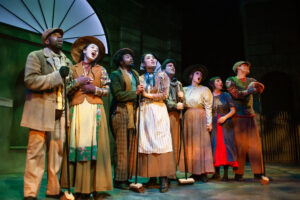
With a long history of season-ending, summer-long, sizzling musicals that consistently sell-out — classics like Cabaret, Evita, Follies, A Chorus Line — San Francisco Playhouse once again takes a much-loved, much-produced audience favorite and opens an exuberant, electric, and absolutely exciting My Fair Lady. As he is so cleverly and creatively want to do, Artistic Director Bill English inserts into the work-horse musical enough of the Playhouse-brand of timely updates and not-so-subtle tweaks to produce a must-see version sure to surprise, challenge, and delight both Lerner and Lowe die-hards and new-comers.
Whether through staged or filmed versions of George Bernard Shaw’s play Pygmalion or of Alan Jay Lerner (book and lyrics) and Frederick Lowe’s (music) musical, how can anyone who has ever stepped into live theatre or streamed the classic movie not know the basic story of the sharp-tongued, cockney flower girl of 1912 London who becomes a sophisticated princess due to a bet made between two, confirmed-bachelor linguists? Out to prove to the skeptical but congenial India-dialect specialist Colonel Pickering that the King’s English is the only factor separating the classes, Professor Henry Higgins eagerly takes on the task to teach a young, uneducated, but extremely street-smart Eliza Doolittle how to be a societal lady who can pass as a duchess. He does so through repeated, ad nauseam practice of now famous and comically mocked phrases like, “The rain in Spain falls mainly on the plain.” Along the way, this much-loved American musical tackles historical (and often reflects current) issues of class difference, treatment of women, and intellectual elitism.
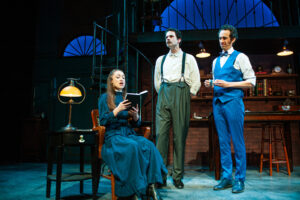
Stepping into roles that many stage and screen actors more famous than they have engrained in audience minds is not a small task for whomever tackles either Eliza or the Professor. Both Jillian A. Smith and Adam Magill not only admirably succeed in taking their places among this illustrious cadre, but each also brings unique interpretations that give their well-known characters qualities that cause audience members to lean in and re-examine and re-acquaint with the Eliza and Higgins they thought they already knew.
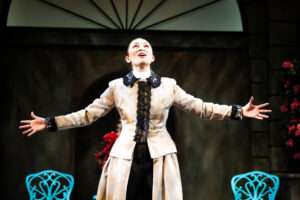
As flower girl Eliza, Jillian Smith squeals, slinks, and sniffles her way to extra coinage and the attention of the nearby Higgins in the opening scenes outside the opera house at Covent Gardens. Her cockney is shrill with her extended “ohhhh’s” sound like the cries of an alley cat. At the same time, she sings and dances with contagious energy, her face aglow amid its dirty cheeks as she daydreams in song “all I want is a room somewhere.” The subsequent, grueling vocal exercises that she undergoes under the Professor’s watchful eye punctuated with her gobbling chocolates or reading texts with her mouth full of marbles give way to an elegant, confident, and absolutely stunning young woman whose signature “I Could Have Danced All Night” is beautifully, lyrically rendered.
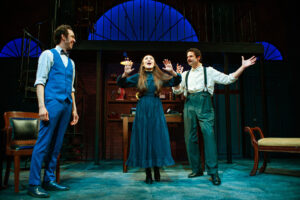
As the pushy, peppery professor, Adam Magill brings his own flair of egocentricity, stubbornness, and full-steam-ahead persistence to his goal of winning a bet. Unlike many past castings, this Higgins is not old enough to be Eliza’s father but is much closer to her as a contemporary in age. His rash impulsiveness, quick explosions of frustration and impatience, and tendencies to pout like a spoiled brat all smack of a man who still has a lot of immature boy in him. His dramatic mood swings are wonderfully illustrated as he sings with much aplomb “I’m an Ordinary Man,” alternating calm flows of pensiveness with frenetic outbursts of sheer panic about having “a woman in my life.”
While perhaps often implied in past productions but rarely made too explicit, Colonel Pickering’s rapt attention on Higgins’ linguistic techniques is clearly more than just due to his academic interests as played so suggestively moon-eyed by a much-talented Brady Morales-Woolery. While never explicitly expressed, it is clear that his Pickering has a hankering for his professor pal; and it is equally clear that Higgins is aware, not insulted, but also probably not reciprocating those same feelings. A phone call by Pickering to “Boozy,” his “old school chum,” seals the deal that Director English has given this Fair Lady a contemporary twist that plays well to a San Francisco setting.
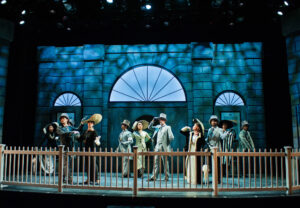
From scenic designs to costumes to individual performances by both principal and featured actors, there are a stack-load of separate reasons why the price of the ticket is well-worth the investment. Nina Ball has once again outdone herself in designing an astonishing set that swings in grand fashion from the austere, stately Covent Gardens street scene to the double-leveled, cluttered, yet dignified home of Higgins to the front door at 27a Wimple Street where the glowing, dreamy-eyed Nicolas Tabora sings in gorgeous clarity lovesick Freddy Eynsford-Hill’s repeated anthems of love to an uninterested Eliza. Ball’s award-worthy sets are made all the more magnificent by both the delicately shifting and the dramatically spotlighted effects of Michael Oesch’s lighting design.
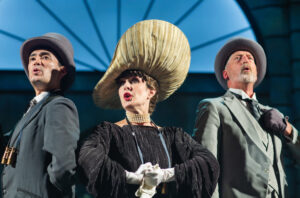
Volumes could be written about the words never said but loudly expressed in the looks of disbelief and dumbfound that Heather Orth’s Mrs. Pierce — Higgins’ housekeeper — gives to the Professor, especially as he asks her in song, “Why can’t a woman be more like a man?” Equally flabbergasted and quite often dismayed of Higgins is his own mother, played with hilarious, aristocratic pompousness by Jill Slyter that melts to bond in genuine, heartfelt alliance with Eliza.
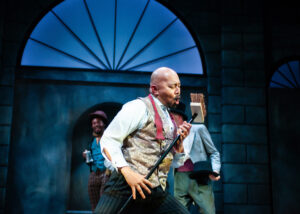
But the performance that is perhaps the one longest to be relished and remembered of the evening is that of Jomar Tagatac as the red-nosed, gruff-voiced, and ale-loaded Alfred P. Doolittle, the conniving but convivial and mostly absent (except when he wants a farthing or two) father of Eliza. Each time his Doolittle is on the stage, hilarity reigns. With a voice that can boom, legs that can kick a jig or waltz a Matilda, and an ability to be one moment a Vaudeville-worthy clown and the next, a homespun philosopher, Jomar Tagatac is a Doolittle that measures up and in many way exceeds any that I personally have ever seen on stage.
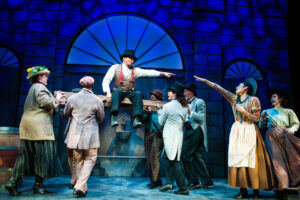
His Doolittle is all the more memorable as backed up by his drinking pals, Harry (Andy Collins) and Jaime (Chachi Delgado) in a laugh-out-loud display of harmonized notes and heel-and-toe stepping in “A Little Bit of Luck.” A stage full of romping, stomping frivolity where can-can kicks, somersaults, and high-aired jumps explode like celebratory fireworks is yet another among many showstoppers as Doolittle celebrates with his mug-chugging pals, “I’m Getting Married in the Morning.” Their rambunctious moves and steps are just one more of the evening’s scenes made all the more exhilarating via the choreography of Nicole Helfer and the dance captain skills of Dian Sitip Meechai and Nicolas Tabora.
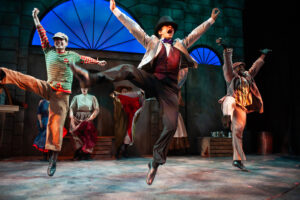
And finally, there are not enough kudos adequate to give deserved recognition to the mind-blowing costumes designed by Abra Berman. From the multi-colored skirts and shawls of flower girls and ragged wears of street merchants and pub dwellers to the striking sophistication of the Ascot wealthy dressed in their subdued blacks, grays, and whites as well as top hats and wide-rimmed hats worn like crowns, Abra Berman creates a kaleidoscope of hues, styles, and textures.
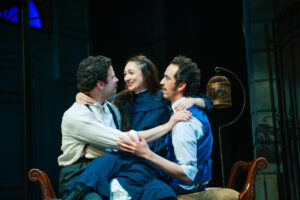
Key for any modern My Fair Lady not to feel too dated is how the transformation of Eliza occurs in such a way that her new “princess” is in the end not seen as subordinate to her “prince,” an issue in many earlier film and stage versions. Director Bill English has solved this issue in several subtle ways that make this production particularly satisfying – mostly in the winding down minutes of the play. When Henry Higgins believes he has lost Eliza for good, he pines through song, “I’ve Grown Accustomed to Her Face,” a song usually sung as he sits alone in his study. English instead places him on the street outside, exactly in the same spot Freddy sang his love songs to Eliza. This positioning helps us believe our egocentric Professor may in fact be deep down a suitor himself. When Henry does move inside, he is heard by an observing Eliza further moaning in slump body and song, “I’ve grown accustomed to the trace, of something in the air.” In a final scene involving the two of them along with an arriving Pickering, San Francisco Playhouse’s My Fair Lady springs into 2025, making a beautiful and moving statement about the possibilities that can and should exist for male-female relationships beyond the so-called-traditional ones the Far Right wants us to believe are the only ones that should exist.
Rating: 5 E, MUST-SEE
A Theatre Eddys Best Bet Production
My Fair Lady continues through September 13, 2025, in a three-hour (with one intermission) production by San Francisco Playhouse, 450 Post Street, San Francisco. Tickets are available online at www.sfplayhouse.org or by phone at 415-677-9596.
Photo Credits: Jessica Palopoli

Leave a Reply